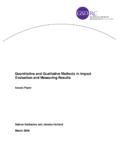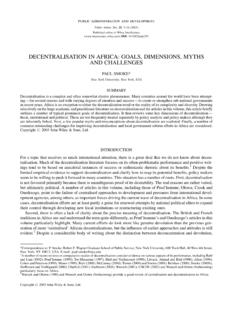Transcription of State-Society Relations and Citizenship
1 TOPIC GUIDE SUPPLEMENT. State-Society Relations and Citizenship in Situations of Conflict and Fragility Huma Haider State-Society Relations and Citizenship in Situations of Conflict and Fragility December 2011. About this topic guide supplement GSDRC Topic Guides provide clear, impartial overviews of current evidence and thinking in topic areas relating to governance, conflict and social development. They introduce key texts, and contain links to one-page summaries of these texts on Statebuilding and peacebuilding, while conceptually distinct, are becoming more closely integrated in academic and policy circles.
2 This publication is one of two supplements to the GSDRC's series of Topic Guides that explore this development: Statebuilding and Peacebuilding in Situations of Conflict and Fragility looks at the links (and tensions). between statebuilding and peacebuilding, how these activities interact, and how they can be approached in practice. State-Society Relations and Citizenship in Situations of Conflict and Fragility looks at concepts of state- society Relations , civic trust, Citizenship and socio-political cohesion in relation to statebuilding and peacebuilding. The publications highlight key issues and debates for each topic covered and identify relevant references.
3 They are to be read in conjunction with the GSDRC's Conflict and Fragile states Topic Guides, in particular the Peacebuilding and Statebuilding chapters. Links to relevant sections from these and other chapters of the guides are highlighted throughout. These supplements were written by Huma Haider (GSDRC). The GSDRC appreciates the contributions of Alina Rocha Menochal (Overseas Development Institute); Alex Stevens (DFID) and Anna Miles (DFID). Comments, questions or documents can be sent to Huma Haider: About the GSDRC. The Governance and Social Development Resource Centre (GSDRC) provides cutting edge knowledge services on demand and online.
4 It aims to help reduce poverty by informing policy and practice in relation to governance, conflict and social development. The GSDRC receives core funding from the UK Department for International Development (DFID) and from the Australian Agency for International Development (AusAID). Governance and Social Development Resource Centre (GSDRC). International Development Department College of Social Sciences University of Birmingham, UK. First published 2010. This updated edition published December 2011. University of Birmingham, 2011. GSDRC, 2011, State-Society Relations and Citizenship | About this topic guide supplement 2.
5 Contents Introduction .. 4. State-Society 6. State legitimacy .. 9. Interaction between formal and informal institutions .. 11. 13. Case studies .. 14. Civic Trust and Socio-Political Cohesion .. 15. Intra- society Relations .. 17. Civic trust and Citizenship .. 19. Socio-political cohesion and nationhood .. 21. 3 Contents | GSDRC, 2011, State-Society Relations and Citizenship Introduction The impact of violent conflict and fragility on a country's society , economy and political governance is devastating and encompassing. The effects can be tangible and visible, including killed and injured civilians; destroyed or derelict infrastructure; and poor and inadequate public service facilities.
6 They can also be intangible, such as lack of confidence and distrust in government; weak social cohesion and the destruction of norms and values; pervasive sense of fear, disempowerment and insecurity; and pessimism about the future. Addressing both types of effects is essential in conflict-affected and fragile contexts. Statebuilding and peacebuilding processes have often focused primarily, however, on the tangible aspects demobilising soldiers; improving and restoring physical infrastructure, buildings and institutions; drafting laws and constitutions; and providing technical assistance and training (Pouligny, 2010).
7 Until very recently, efforts undertaken by the international community to promote statebuilding have focused on the state, resulting in a top-down approach centred on formal institutions. Those working in peacebuilding, on the other hand, have often advocated a bottom-up civil society approach. Increasingly, however, statebuilding and peacebuilding concepts and strategies have evolved in ways that have brought them closer together. Establishing strong public institutions is now considered essential in the promotion of peace; and developing institutions that are responsive to the demands of citizens and inclusive processes that treat members of society as active agents are considered important to statebuilding.
8 The concept of State-Society Relations and efforts to foster positive, mutually constructive Relations has thus received greater attention. The OECD DAC has emphasised the importance of looking beyond the mere forms of institutions in statebuilding processes to State-Society Relations , state legitimacy and the political and social fabric of society . This supplement focuses on these crucial intangible aspects of statebuilding and peacebuilding: promoting positive State-Society and intra- society Relations ; restoring or generating trust in government and public institutions and trust among citizens; and fostering notions of Citizenship and socio-political cohesion.
9 Left unaddressed, statebuilding and peacebuilding efforts are unlikely to succeed. Pouligny, B., 2010, State-Society Relations and the Intangible Dimensions of State Resilience and Statebuilding: A. Bottom Up Perspective', EUI Working Paper, no. 33, Robert Schuman Centre for Advanced Studies, European University Institute (EUI), Florence Crucial social and cultural elements underpin state institutions and ensure that they function. This is especially important to understand in 'fragile' settings. This paper argues that conventional perspectives need to be broadened beyond tangible dimensions of state resilience, institutions and statebuilding to include intangible dimensions.
10 International actors need to gain an understanding of the relationships, structures and belief systems that underpin institutions, and of the multiplicity and diversity of political institutions, cultures, and logics through which statebuilding processes may be supported. See one-page summary: Interpeace, 2010, Voices of Civil society Organisations on Peacebuilding and Statebuilding', Background Paper, prepared as an input into the International Dialogue on Peacebuilding and Statebuilding, Interpeace, Geneva What are the views of civil society organisations (CSOs) on statebuilding and peacebuilding? This report presents the findings of a consultation designed to input into the International Dialogue on Peacebuilding and Statebuilding (Timor- Leste, April 2010).









